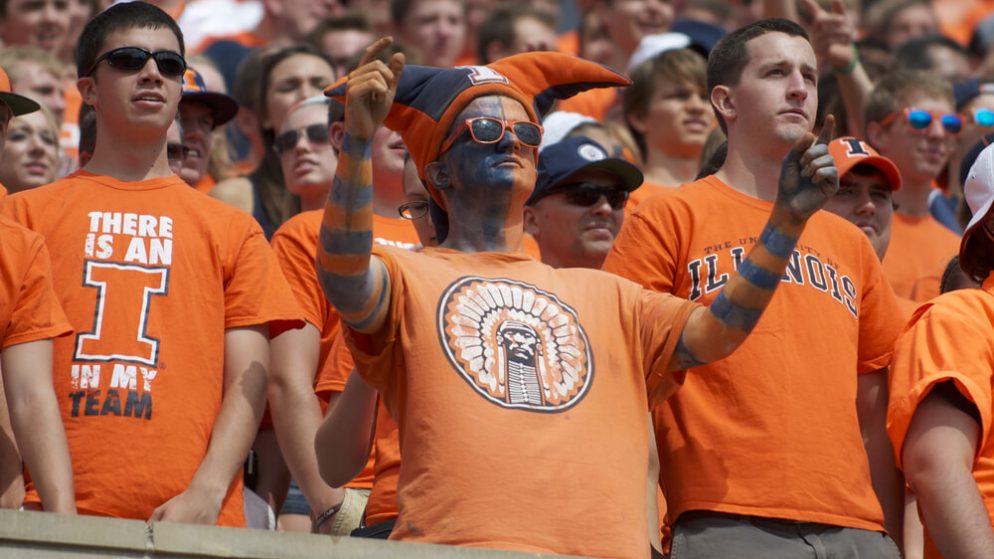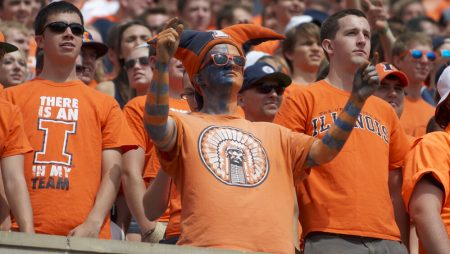

Sports bettors in Illinois can now place bets on Northwestern, DePaul, and other state college teams. Governor J.B. Pritzker signed legislation allowing bets on in-state collegiate action, despite opposition by some university officials. Coaches and school counselors, among others, argue that it places student-athletes at risk.
The move is expected to significantly boost the state’s growing sports betting industry. Already, Illinois is among the top revenue states for sports betting revenue. Launched in March 2020, Illinois’ sports betting market is already among the three biggest markets in the US. October was the state’s best month yet, with a jaw-dropping $840 million bets placed statewide.
What we cover
Collegiate Betting Allowed, with a Few Caveats
First of all, betting on Illinois college teams can only be done in person, not with an online or mobile sportsbook. Bettors will need to go to one of the casinos or racetrack sportsbooks. This may frustrate some Illinois sports bettors since the vast majority of bets are placed on mobile devices.
Second, bets are limited to the outcomes of a game, and can not be placed on an individual athlete’s performance.
Finally, the ban on in-state collegiate games could be reinstated after two years. At that time, state lawmakers will need to pass another bill allowing college sports betting.
State Representative Mike Zalewski, D-Riverside, thinks the law strikes a good balance between player safety and the sports betting market.
But, some argued that Illinois residents already could bet on Illinois college teams by crossing the state line to Indiana. However, those potential tax dollars went to Indiana and not Illinois.
College Officials Opposed the Measure
Among those staunchly opposing the move is Josh Whitman, University of Illinois athletic director. He argues that student-athletes could face bullying and physical threats from bettors if they fail to perform. Some of those threats could even come from people living in the same dorm. Whitman traveled to Springfield several times to argue against the legislation.
Danielle Suprenant, Western Illinois University Director of Athletics, also opposed lifting the ban on in-state collegiate betting. Suprenant stressed the effect this could have on a student athlete’s mental health, as well as the integrity of the game. Like Whitman, she pointed to potential bullying and intimidation by other students.
For now, there is only a two-year window for Illinois sports bettors to wager on college games. If there is a measurable detriment to either the integrity of the games or player mental health, the bill might not be renewed.
Sportsbook Slated for DuPaul Wintrust Arena
The law signed by Pritzker also authorizes a sportsbook at Wintrust Arena, where DuPaul University’s men and women’s basketball teams play. The arena also hosts the Chicago Sky professional women’s basketball team.
The Wintrust Arena sportsbook was likely aimed at benefiting the Chicago Sky. But, it could also be the first sportsbook within a college area. Once a sportsbook is built at Wintrust, bettors can easily lay down wagers on the DuPaul Blue Demons.
It’s unlikely that any other college sports arena in the state will open a sportsbook. Fans of the Fighting Illini, Loyola Ramblers, and the Northwestern Wildcats will need to place their bets at a casino.
Illinois Sports Bettors Can Also Register Online
The same bill that opened Illinois to in-state collegiate betting also eliminated the in-person registration requirement. Beginning March 5, sports bettors can sign up for a new account online rather than in-person.
Previously, a would-be sports bettor might need to take a long trip to a casino with a sportsbook in order to register an online account. With only ten retail sportsbooks in the state, bettors in rural areas had a long drive.
Municipal Video Gaming Push Taxes Banned
Typically, every time a player pushes a button on a gambling machine, a one-cent tax is levied. Many smaller towns and cities around the state implemented these push taxes to help fill the community tax coffers.
The bill signed by Pritzker required municipalities in the state to institute a push tax on video gaming by November 8, 2021. After that, the window closes on municipal taxes.
Dolton, Calumet City, Markham, University Park, and South Chicago Heights rushed to put a push tax in place.
Push taxes came into being when Oak Lawn city officials became dissatisfied with the way video gaming taxes were divided. In 2019, gaming legislation increased the state’s cut of video gaming tax revenue from 25% to 29%. But, the municipalities’ where the machines reside only received 5%.
With this recent legislation, no new push taxes can be instituted.






